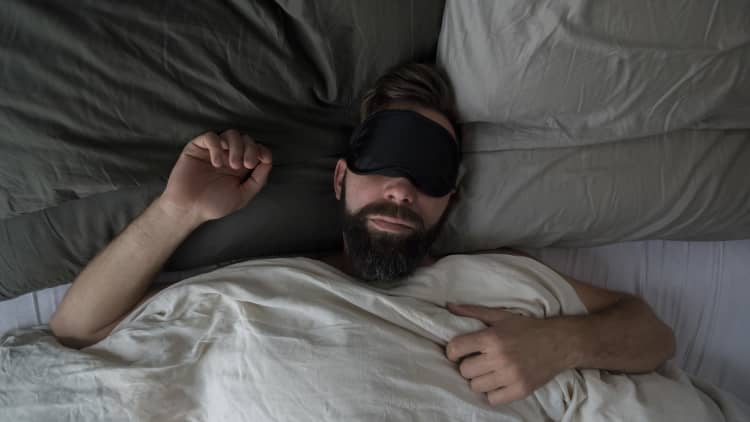From weird dreams and nightmares to increased insomnia, the coronavirus pandemic has stimulated some unusual sleep issues for many people.
As a member of the outreach and public education committee for the Society of Behavioral Sleep Medicine and as a researcher and resident at the University of Alabama at Birmingham, a number of patients have been asking: "Why is this happening, and what can I do to stop it?"
We do most of our dreaming during a stage of sleep called "rapid eye movement" (REM). This is when the brain grows more active and revs up the amygdala and hippocampus (regions of the brain that deal with emotions and memories).
In this time of heightened fear and distress, the brain has even more emotional demands to process. And because our brain likes order, the frontal lobes attempt to process, organize and integrate our thoughts to make sense of the chaos of REM neural signals (which is what produces those dreams).
Many people have also started waking up later in this era of working from home, and because REM periods tend to last longer in the morning, this allows more time for dreaming.
Additionally, difficulties falling or staying asleep due to worry may reduce total sleep time. Shorter sleep duration may constrict REM sleep. However, this increases the pressure for REM later, resulting in more REM upon the next sleep opportunity. During this "REM rebound," dreams can often feel more vivid, intense and emotionally charged.
What I'm doing to sleep better during Covid-19
Like so many others, I've also had my fair share of weird and memorable dreams since the pandemic.
In one dream, I boarded a cruise ship, dressed head to toe in bubble wrap and carrying nothing but a roll of toilet paper. In another, I slept through my shift at the telemedicine clinic and missed all my patients.
Luckily, I've been able to get those unwanted dreams under control. Here's what I've been doing to sleep better at night:
1. I wake up at the same time every day.
We tend to keep a consistent sleep schedule mostly during the weekdays. But I'm now waking up at 5:30 a.m., seven days a week.
This helps because the body rewards regularity: People who wake up at the same time experience more metabolic health, improved cognition and enhanced emotion regulation.
To keep myself accountable, I place my alarm clock across the room so that I have to get out of bed to turn it off. I've also created an enjoyable morning routine that involves coffee and gratitude journaling outside, where I can bask in the morning light.
Having something pleasant to look forward to makes waking up easier, while the natural light helps entrain my circadian rhythm.
2. I do everything I can to stay active during the day.
This can be a difficult task during a time of social distancing and quarantining. It now feels nearly impossible to get in as much physical movement as I did before the pandemic.
But it's still important to try. Vigorous, moderate or even mild cardiovascular exercise (i.e., walking or doing household chores) stimulates adenosine, which helps build sleep pressure — or the body's "hunger" for sleep, and increased sleep pressure means improved sleep.
However, I avoid exercising too much in the evenings. Exercise within one hour of bedtime can reduce sleep time and can prolong sleep onset.
3. I use my bed for three things: Sleep, sex and rest (if I'm sick).
Everything else — watching, reading or anxiously scrolling through my phone for news about Covid-19 — happens out of the bed.
With more time spent inside, people may start adopting the habit of eating, working or binge-watching Netflix in bed. This can be disruptive to our sleep, because it trains the brain to associate the bed with daytime activities, rather than a place for resting.
Even on nights when I find myself unable to sleep, I'll get out of bed and go to another room. Keeping a dim light on, I'll do something relaxing, like guided meditation or fold the laundry. When I'm finally sleepy again, I'll return to bed.
4. I take a bath before bedtime and avoid devices.
Darkness facilitates healthy production of melatonin, a hormone that promotes drowsiness; whereas light interrupts it. So at least one hour before bedtime, I try to reduce my exposure to light-emitting devices, such as my phone, laptop and TV.
Instead, I take a hot bath or shower. According to studies, our core body temperature needs to drop by about 2 to 3 degrees Fahrenheit to maintain deep sleep — and soaking yourself in warm water can help.
Most people think it's easier to fall asleep after a bath because your body is nice and toasty. But the opposite happens: It actually brings the heat from the core of your body to the surface, thus naturally cooling the body and promoting a more peaceful sleep.
Christina Pierpaoli Parker is a behavioral sleep researcher and clinical psychology resident at the University of Alabama at Birmingham, and she is also a member of the outreach and public education committee for the Society of Behavioral Sleep Medicine. She writes about sleep for Psychology Today and HealthDay, and her work has been published in the Journals of Aging & Health, Geriatric Psychiatry and The Clinical Gerontologist.
-Donna Arand, PhD, contributed to this story.
Don't miss:
- Stock up on these 9 healthy foods to boost your immune system during coronavirus, says doctor and dietitian
- I told my landlord I couldn't pay April rent—due to COVID-19. This is his incredibly emotional response
- Why we should all start making our own face masks during coronavirus—and an expert-approved guide on how
Check out: The best credit cards of 2020 could earn you over $1,000 in 5 years



